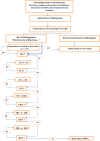Knowledge, attitudes, and practices about homelessness and willingness-to-pay for housing-first across 8 European countries: a survey protocol
- PMID: 30505443
- PMCID: PMC6260705
- DOI: 10.1186/s13690-018-0317-x
Knowledge, attitudes, and practices about homelessness and willingness-to-pay for housing-first across 8 European countries: a survey protocol
Abstract
Background: Most European countries report rising numbers of people experiencing homelessness. For those with mental disorders, interventions are centered on achieving mental health and drug rehabilitation alongside housing readiness, often to the detriment of access to housing. Notwithstanding, more European countries are investing in a new model, Housing First (HF), which postulates immediate access to permanent housing with no initial requirements for treatment. While results of the European HF programs are published on individual-level data, little is known about the opinions of the general population about homelessness and the societal value of the HF model, which can represent barriers to the model's dissemination. Therefore, we present the protocol of a study designed for the following objectives: 1) to explore the knowledge, attitudes, and practices (KAP) about homelessness within the general population of 8 European countries, 2) to assess the valuation of the HF model by European citizens, and 3) to estimate the lifetime prevalence of homelessness in the targeted countries.
Methods: A telephone survey was conducted from March to December 2017 among adults selected from opt-in panels from France, Ireland, Italy, the Netherlands, Portugal, Spain, Poland, and Sweden. A total sample of 5600 interviews was expected, with 700 per country. The interviews included three sections: first, the KAP about homelessness; second, the valuation of the HF model by measuring a respondent's willingness-to-pay (WTP) through the contingent valuation method; and third, an assessment of the lifetime prevalence of homelessness among the general population. Descriptive analyses and comparisons between countries will be conducted. KAP indicators will be created and their psychometric properties assessed. Determinants of WTP will be assessed through regression models.
Discussion: This survey will highlight Europeans' views of homelessness, especially their level of tolerance towards homelessness, potential misconceptions and the most important barriers for the implementation of the HF model. Additionally, the results on the valuation of the HF model by citizens could be instrumental for key stakeholders in understanding the level of support from the general population. Ethics approval has been obtained from the Aix-Marseille University Ethics Committee (n° 2016-01-02-01) for this study, which is part of HOME_EU: Reversing Homelessness in Europe H2O20-SC6-REVINEQUAL-2016/GA726997.
Keywords: Bidding game; Contingent valuation; Europe; Homelessness; Housing First; Knowledge, attitudes, practices (KAP); Public opinion; Willingness-to-pay (WTP).
Conflict of interest statement
Ethics approval for this study has been received from the research ethics committee of Aix-Marseille University (reference number: 2016-01-02-01). Moreover, at the beginning of each telephone call, the selected person can indicate whether he or she wishes to participate in the survey. He/she may also refuse to answer the questions asked and end the interview whenever he/she wishes.Not Applicable.The authors declare that they have no competing interests.Springer Nature remains neutral with regard to jurisdictional claims in published maps and institutional affiliations.
Figures
References
-
- The Foundation Abbé Pierre, Feantsa. The Second Overview of Housing Exclusion in Europe 2017 [Internet]. Brussels; 2017 Mar p 67. Available from: https://www.feantsa.org/en/report/2018/03/21/the-second-overview-of-hous....
-
- European Commission. Confronting homelessness in the European Union. Social investment package. Commission staff working document. SWD (2013) 42 final, 20 February 2013 [Internet]. 2013 [cited 2017 Aug 4]. Available from: http://aei.pitt.edu/45917/.
LinkOut - more resources
Full Text Sources
Research Materials
Miscellaneous


